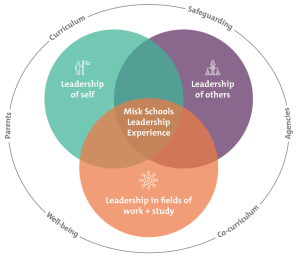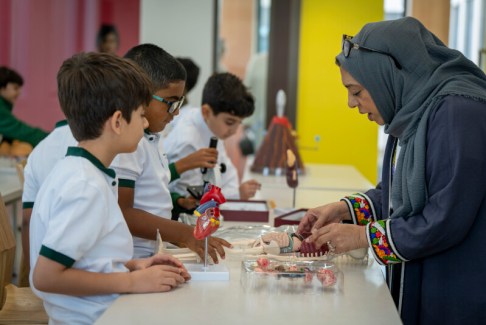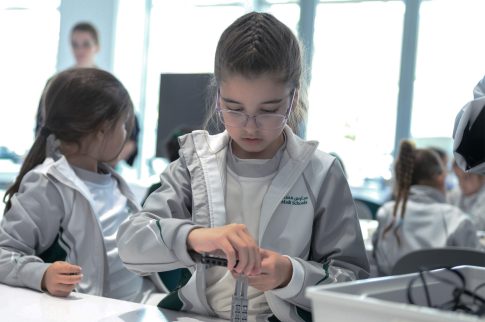Purpose-driven leadership through an integrated educational approach
If teaching leadership skills in school is important, how can it be best fitted into the curriculum, asks Steffen Sommer.
It’s complicated
Leadership is complicated, comprising a dynamic interplay of skills, knowledge, and behaviours.
Given this complexity, the most effective way to teach leadership in a school setting is to weave it into established teaching frameworks and pedagogical methods, making it a natural and pervasive part of the learning experience. In other words, to help students become unconsciously aware of developing and practising leadership in everything that they do.
Developing student leadership is one of our most important priorities at Misk Schools because our mandate, our raison d’être if you like, is to nurture the next generation of leaders prepared to take their place on both Saudi and global platforms.
The school’s motto is Lead with Purpose, reflecting our belief that exemplary leaders are guided by a sense of purpose, embodying qualities such as empathy, integrity, and a commitment to positive change.
Making Leaders
In the age-old debate of ‘Leaders are Born vs Leaders are Made,’ we stand firmly in the latter camp. Leadership, we believe, can be taught through intentional efforts and sustained commitment – but it needs a structure and a methodology.
To that end, we have worked with experts at the Inspirational Development Group (IDG) to build a new leadership curriculum that integrates with academic lessons, co-curricular activities, High Performance Learning (HPL), and all other aspects of a student’s life at our school.
Defining Leadership
 We started by breaking it down, defining it as a blend of self-leadership, leadership of others, and leadership in one’s work and study.
We started by breaking it down, defining it as a blend of self-leadership, leadership of others, and leadership in one’s work and study.
Self-leadership involves understanding personal strengths, weaknesses, and setting goals, while leading others requires recognising team dynamics and fostering collaboration.
Leadership in work and study demands awareness of standards and taking deliberate steps toward achieving set goals. We also deconstructed a number of well-recognised approaches to teaching leadership, a process that resulted in the identification of eight key leadership pillars:
- Effective Communication
- Emotional Intelligence
- Motivation
- Development of Self and Others
- Embodying Values
- Effective Decision-making
- Mental Agility
- Leading High-performing Teams
These pillars now form the backbone of a curriculum that integrates leadership into every facet of a student’s learning journey from Grade 7 to Grade 12. Some aspects are also applied in the younger years.
Integration with academic lessons and HPL

In order to connect leadership and academic learning, we introduced a new role, that of Leadership Facilitator. Using the eight pillars above, these specialists collaborate closely with teachers, co-creating and co-delivering lessons with specific leadership learning outcomes. These average between 40 and 50 per year (approximately one to two per week) and are achieved in tandem with academic outcomes.
As an HPL school, our project had to overcome a secondary layer of integration – between academic and leadership activities in the classroom and HPL.
Happily, given HPL’s own approach to developing Advanced Cognitive Performance characteristics (ACPs – how we think) alongside specific Values, Attitudes, and Attributes (VAAs – how we behave) the linkage proved to be quite natural and instinctive, mapping extremely well to the development of leadership skills.
For instance, if a leadership learning outcome focuses on acquiring the skill of evaluating a plan, the tie-in with HPL’s Strategy Planning prompts a discussion on effectively planning for examinations, study sessions, or projects. This not only enhances students’ comprehension of the significance of VAAs and ACPs, but also aids teachers in their pursuit of academic excellence.
Learning by doing

As well as learning about the history and science of leadership, and receiving daily leadership coaching in the classroom, students also get involved in regular experiential projects and assignments throughout the year. These initiatives are designed to ensure they become leaders, rather than those who just know about leadership. Participating in simulated leadership and entrepreneurial activities provides a secure environment where students can make mistakes, learn, and iterate, thereby bridging the gap between theory and practice.
In conjunction with the standard array of school leadership opportunities such as Heads of School, House Captains, School Council, leadership roles within co-curricular teams and clubs, participation in competitions and Olympiads etc, students are urged to enrol in formal leadership development programmes. These include Model United Nations, Model Arab League, Pearson’s Higher and Extended Project Qualifications, among others. Additionally, we organise annual Grade 9 and 11 Leadership Bootcamps, all Grade 9 students participate in customised internships with a leadership focus and also work towards a Level 2 Award in Team Leadership from the Chartered Management Institute.
Assessment

Assessment revolves around gauging the tangible effects of applying leadership principles. Rather than merely testing students’ capacity to memorise and reproduce information, the objective is to comprehend how the practical application of leadership theories influences their day-to-day roles as leaders, collaborators and followers, as well as the impact they exert on others.
Consequently, students embrace their leadership development not as a race to a conclusive endpoint, but as the commencement of an ongoing and iterative journey.
Initially, they receive support in recognising their leadership strengths and engaging with leadership theories through hands-on learning activities. Throughout the academic year, both students and teachers document instances of applying leadership strengths. Through guided reflection and coaching, students delve into the repercussions of such behaviours on both themselves and others. They grasp that self-awareness, reflection, and adaptability in behaviour are pivotal to leadership success, aligned with the prevailing circumstances of people, place, and priorities.
Complementing the assessment methodology, each leadership coaching, teaching, and learning session is documented, culminating in a termly matrix that reflects how much time each student has dedicated to various aspects of leadership learning.
Research and evolution
The school’s Leadership Research team, led by Dr Kay Sanderson, PhD MBA, PGCE, and Dr Hibah Khalid Aladasani, Assistant Professor in the School of Education at King Faisal University, is conducting research to critically evaluate the impact and efficacy of the new curriculum. Their ongoing work aims to contribute valuable insights that will further enhance the programme and facilitate its adaptation for broader educational contexts.
 Dr Steffen Sommer has over 25 years of experience in senior roles across Europe and the Middle East. He joined Misk Schools in August 2022 from Doha College, where he was Principal for seven years.
Dr Steffen Sommer has over 25 years of experience in senior roles across Europe and the Middle East. He joined Misk Schools in August 2022 from Doha College, where he was Principal for seven years.
Connect with Dr Sommer on LinkedIn.
All images: with kind permission from Misk Schools
Further reading:
https://whichschooladvisor.com/saudi/guides/what-is-a-high-performance-learning-school
https://www.arabnews.com/node/1484146/saudi-arabia

